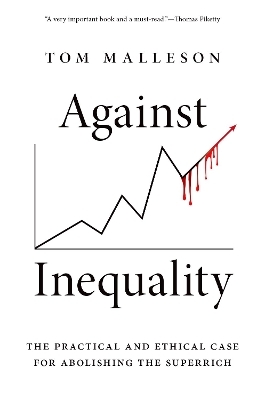
Against Inequality
Oxford University Press Inc (Verlag)
978-0-19-767039-2 (ISBN)
Stark inequality is a problem the world over, but it has been worsening over the past thirty years, particularly in rich, economically developed countries. To acquire the same amount of wealth as Elon Musk, the average American worker would have to work for more than four and a half million years. Is this inequality morally acceptable and is it feasible to actually reduce inequality in the real world?
In Against Inequality, Tom Malleson makes the case for rejecting meritocracy, presenting a strong defense against the claim that individuals "deserve" their wealth. Malleson argues that people, especially rich people, do not morally deserve the bulk of their income because it does not, by and large, come from anything the specific individual does, but is largely due to the vast understructure of other people's labor, in addition to their lucky possession of bodily talents and efforts. Furthermore, the book brings to light extensive historical and comparative evidence to show that raising taxes on both income and wealth is practically feasible and that the costs of doing so are far outweighed by the truly enormous benefits that such taxes could bring in terms of environmental sustainability, democratic equality, equal opportunity, and reduced racism and xenophobia.
Unlike previous books on inequality, Against Inequality focuses on the superrich, arguing that they have far too much: a world with billionaires alonside severe deprivation is a world without justice. Malleson's argument is not that billionaires are individually evil, but that a society that allows the existence of the superrich is structurally immoral. In an era of remarkable wealth idolatry, Against Inequality takes the radical position that we should abolish the billionaires.
Tom Malleson is Associate Professor in the Department of Social Justice & Peace Studies at King's University College at Western University. Their work focuses on egalitarianism, feminism, and radical democracy. They are Coordinator of the Real Utopias Project and their recent books include Part-Time for All: A Care Manifesto (with Jennifer Nedelsky) and After Occupy: Economic Democracy for the 21st Century. They are also a longtime social justice activist and organizer.
Acknowledgements
Introduction
Chapter 1: Is it Feasible to Reduce Inequality? Income Tax and Market Regulations
Chapter 2: Is it Feasible to Reduce Inequality? Wealth Taxes and Tax Havens
Chapter 3: Should We Aim for High Taxes and Low Inequality? Weighing Costs and
Benefits
Chapter 4: Do Rich People Deserve Their Income?
Chapter 5: Do the Skilled and Hard Working Deserve More Than Others?
Chapter 6: Does Voluntary Exchange of Private Property Justify Inequality?
Chapter 7: How Much Inequality is Acceptable? The Case for Maximum Limits on Income and Wealth
Conclusion
Bibliography
| Erscheinungsdatum | 17.07.2023 |
|---|---|
| Verlagsort | New York |
| Sprache | englisch |
| Maße | 235 x 156 mm |
| Gewicht | 617 g |
| Themenwelt | Geisteswissenschaften ► Philosophie |
| Sozialwissenschaften ► Politik / Verwaltung ► Politische Theorie | |
| Wirtschaft ► Volkswirtschaftslehre ► Wirtschaftspolitik | |
| ISBN-10 | 0-19-767039-3 / 0197670393 |
| ISBN-13 | 978-0-19-767039-2 / 9780197670392 |
| Zustand | Neuware |
| Haben Sie eine Frage zum Produkt? |
aus dem Bereich


